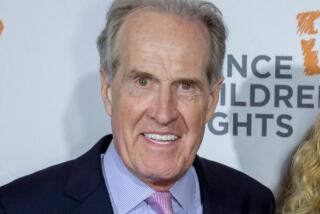Judge Orders Lawyers to Give Parker Documents or Be Jailed : Courts: Attorneys for creditors of businessman accused of fraud and bribery insist papers are privileged.
- Share via
LOS ANGELES — After five months of haggling among lawyers in the fraud and bribery case of businessman Michael E. Parker, a federal judge Wednesday ordered some of the attorneys to either give Parker documents he says he needs for his trial--or go to jail.
The trial is now set for Jan. 12, almost a year and a half after it was originally scheduled and nearly two years since FBI agents arrested Parker at his $1.4-million Big Canyon home.
Parker, 44, a flamboyant Newport Beach businessman with a taste for expensive cars, was indicted in February, 1991, on 49 counts of racketeering, fraud, money laundering, tax evasion and bribery. He is accused of stealing as much as $11 million from Columbia Savings & Loan in Beverly Hills in what federal prosecutors say was one of the largest thrift frauds in Southern California.
Columbia, a $5-billion thrift whose TV commercials touted how well-managed it was, was taken over by the federal government last year after investing heavily in junk bonds.
Through a company called Parker North American Corp., Parker in the mid-1980s sold Columbia an unusual type of investment--leases on office equipment. Some of those leases, prosecutors say, turned out to be phony or inflated.
A Columbia vice president, Jeffrey S. Worthy of Downey, last year pleaded guilty to taking $1.4 million in bribes from Parker to look the other way. One of Parker’s subordinates, Brian W. Fink of Orange, pleaded guilty to getting $1 million.
Both are expected to testify against Parker, who until his indictment was known in Newport Beach primarily as a heavy contributor to the Republican Party and as an up-and-coming young executive, winner of an Entrepreneur of the Year award from his accountants, Ernst & Young.
The trial was delayed after both sides requested more time to prepare. Then the federal judge hearing the case was assigned a lengthy police corruption case.
Finally, the trial was set for April. Meanwhile, federal prosecutors had filed a motion saying they were going to introduce more evidence that they said showed “intent to defraud.” Among them: that Parker had allegedly invented lease deals when he ran a company called North American Video Corp. in the 1970s; that he allegedly defrauded investors in another of his companies, Parker Automotive Corp., of $5 million in 1990 when he lied about how well the company was doing; and that he took $3 million out of Parker North American in the late 1980s while it was “in poor financial condition.”
To defend himself against the allegations, Parker said, he needed some of the records of the lawyers representing the creditors committee of Parker North American, which had filed for bankruptcy protection in 1989 owing $39 million. The lawyers refused.
The fight has meandered through the federal courts in the five months since; Wednesday’s hearing was only the latest skirmish.
The law firm representing Parker’s creditors--Frandzel & Share in Los Angeles--refused to relinquish the records, saying they are privileged communications between the lawyers and their clients.
At Wednesday’s hearing, which Parker attended, U.S. District Judge Robert M. Takasugi held the law firm and lawyer John A. Graham in contempt and ordered them to turn over the documents or go to jail and pay $500 for each day that they refuse.
Takasugi then said he will not enforce his order, however, until after the U.S. 9th Circuit Court of Appeals ruled on whether the law firm must turn over the documents. By threatening to jail Graham, lawyers said, Takasugi ensured that the appeals court will hear the case within 30 days, as federal law requires when the possibility of jail time is involved in contempt cases.
More to Read
Sign up for Essential California
The most important California stories and recommendations in your inbox every morning.
You may occasionally receive promotional content from the Los Angeles Times.













